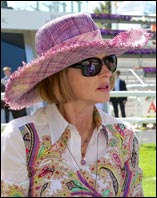By Gai Waterhouse
Something that is particularly unique Down Under is the vast number of syndicated horses. In the U.S. there are syndicators such as Eclipse Thoroughbred Partners, West Point Thoroughbreds and Team Valor. In England there is Highclere Racing, Middleham Park Racing and Elite Racing Club amongst a few others, but in Australia syndicates are big business.
Unlike in England, horse racing in Australia has never been labeled 'The Sport of Kings'; quite the opposite, actually. I wouldn't be so bold, or presumptuous of my ancestors, to suggest why Australians love a bet, but they just do. Why horse racing? I believe it stems from a huge country racing circuit. Much like America, Australia has a massive land mass and some towns could be many hours from the next. So what did many of these towns build to entertain their residents? Racecourses. Most Australians will have some sort of childhood memory of them and their parents, or even grandparents, attending the local races whether it's at Bong Bong, Randwick or one of the other 360 registered racecourses. Horse racing is the second-most popular spectator sport in the country and it injects $7.7 billion into the Australian economy every year. This is because horse racing is accessible to everyone, and that includes ownership.
I train over 100 horses of all ages, and having 10-20 owners in each is quite the norm. The average full-time wage in Australia, before tax, is about $75,000, so buying a whole horse is not an option for everyone but a 10% share might not be out of reach. Syndicators are therefore a major part of my business.
Having both syndicated horses and those owned outright makes it more of a juggling act. The bigger owner might be the breeder of the horse, they might have bought it to breed from in the future or they might simply have just fallen in love with the horse at first sight. Whatever their motive, the stakes are high as they have invested considerable dollars and even more than that, they are emotionally invested. That is not to say that members of syndicates are not emotionally invested, of course they are, but the major owner has a greater focus on racetrack success. Members of syndicates tend to purely want some entertainment. Days at the races and the stables with friends and family give such enjoyment and if they get a good colt like Sebring (syndicated for $130,000, standing at Widden Stud for $66,000 per serve) or Vancouver (bought for $185,000 as a yearling and sold for a record-breaking figure), or a class filly like Sweet Idea (bought for $240,000, earned over $2.4 million and sold for $1.6 million), it is a bonus.
I endeavour to give each and every owner in my stable a pleasurable experience and to keep the information flowing, which tends to be a mixture of phone calls, emails and text messages. Having the right team around me is paramount. It's quite funny on race day because suddenly everyone is going through the same emotions whether you are the owner of many horses, or a small share in one horse. Whichever category my owners fall into, I will always celebrate and make future plans with the winners, and analyse and discuss the result with the losers. I don't want the 10% shareholder to feel unimportant because as I previously mentioned, these people are the building blocks of the racing industry in Australia. In the same breath, I want those who own horses outright to feel fully engaged and in the know with what's happening with their horses because let's face it, the horses are family.
Gai Waterhouse is arguably Australia's most recognized trainer internationally. Gai has trained over 130 Group 1 winners since earning her trainer's license in 1992, including six Golden Slipper winners. Gai was inducted into the Australian Racing Hall of Fame in 2007. She pens a monthly column for the TDN.
Not a subscriber? Click here to sign up for the daily PDF or alerts.






